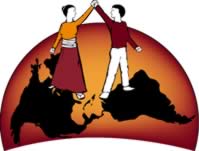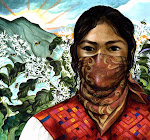San Salvador, February 2008
Dear Friend:
We are writing you about El Salvador's upcoming elections and CIS international monitoring and observation work. Each election cycle presents a different set of challenges, and the upcoming 2009 elections will be no different. Already the rightwing legislature has implemented obstacles to a fair process and there are serious threats to the rights of civil society to seek change (see below). It is less than a year until the 2009 elections, and we are writing to invite your participation and support. This election cycle will be hotly contested, as civil society and the FMLN have united behind Mauricio Funes, the FMLN candidate for President. There are currently numerous ARENA candidates vying to represent the party in power, and the smaller parties are maneuvering for space. Your help is important to encourage a free and fair choice for the Salvadoran electorate.
The CIS Electoral Observation Missions conform to the principles set forth by the Carter Center, "To be effective, election-monitoring missions should begin long before Election Day, be invited by a country's national authorities and be welcomed by the major political parties. Observers analyze election laws, assess voter education and registration processes, and evaluate fairness in campaigns. The presence of impartial election observers deters interference or fraud in the voting process, and reassures voters that they can safely and secretly cast their ballots and that vote tabulation will be conducted without tampering." (From The Carter Center Democracy Program, www.cartercenter.org)
The ability of CIS to monitor the entire electoral process from the campaign through the vote and vote count and our subsequent report on the process has encouraged reforms that support the movement toward a true democracy in El Salvador. For example, the Supreme Electoral Tribunal redesigned the voting booth to attempt to guarantee a secret vote and has begun to implement a pilot program of residential voting.
Municipal and national assembly elections are held every 3 years and presidential elections every 5 years; every 15 years they fall on the same date. In 2009 elections for every public office will be held- Municipal, Legislative and Presidential. The right-wing parties that control the process have thrown up a roadblock by splitting the election into two different election days: January 18 and March 15, 2009. This doubles the effort and the expense of elections both for tax payers and political parties and diminishes the ability of opposition parties, which have smaller campaign budgets, to compete on a level playing field.
Other reforms that were passed in the Legislative Assembly in December 2007 take away safeguards for free and fair elections. For example, the ballot will no longer be signed or stamped at the voting table to guarantee its validity. Additionally, there will be 3 right wing political parties and three left political parties participating in the 2009 elections. Previously, all parties could have a representative at the table or there was a lottery, but a reform passed in December guarantees a seat at each and every voting table for all 3 right wing parties and only two of the three left parties, where decisions are made as to the validity of a vote.
For a nation to claim it is democratic, at some point there needs to be a change of government, an alternability of power. Elections are the vehicle in modern democracies that are intended to reflect the will of the people and promote equality in opportunity, and movement toward economic and social justice. For CIS, it is important to accompany a fair, honest and nonviolent electoral process in El Salvador in order to allow the maximum opportunity for the elections of 2009 to demonstrate the will of the majority of the people of El Salvador.
Civil rights are in jeopardy for the first time since the signing of the Peace Accords. Legal protests against water privatization provoked the unwarranted arrest of activists in July 2007. The activists face charges of terrorism and if convicted face many years in prison in upcoming trials in February 2008. After international protest, the Salvadoran Government changed its Penal Code so that charges of disorderly conduct are now a felony instead of a misdemeanor. As a result, union activists who protested against privatization of public health care are also facing prison terms, but under charges of "disorderly conduct".
Your presence in El Salvador as an organization and/or as individual observers will enrich your understanding of our world, as you accompany a people in search of social justice through an important moment in their history, which will prove critical as to whether or not a democratic society can be consolidated, as set forth as the objective of the 1992 Peace Accords.
Here are the ways you can support CIS International Observer Mission:
- Be an international observer: In 2009, there will be two CIS International Election Observer missions. The first will be from January 12-20, 2009, and will observe the Mayoral and Legislative Elections. The second will be from March 9-17, 2009 and will observe the Presidential elections. You will receive observation training, orientation to the municipality where you will observe, observer credentials and information about the current situation in El Salvador from human rights officials, representatives of Salvadoran civil society, and with the political parties involved in the elections. Interpreters will be present with each group of observers and Spanish is not a requirement.
- Volunteer and help set up the CIS Mission. CIS will be relying on a group of 3 and 6 month volunteers to plan and help out with the entire electoral cycle of 2009. If you have Spanish ability, and the desire to make this kind of commitment, please contact us. We need volunteers from October 2nd 2008 to April 2, 2009; January 2 to April 2, 2009 and January 2nd to July1, 2009 to write and present the report. Please send your C.V. and a letter of interest and the dates you will be available to: misionelectoral_cis@yahoo.
- Donate to CIS Building Democracy Fund. CIS needs funds to be able to monitor the entire process; from legislation being passed that affects the process, civil rights trials pending, and the campaign, which extra officially has already begun. We are requesting that organizations and individuals consider giving a contribution of $500 to carry out election monitoring prior to the observer mission. This fund will also be used in a non-partisan manner to mobilize voters in rural areas to the polls, some of whom have to walk up to 15 kilometers to get to polling station or sacrifice a day's wages for transportation to vote in just one of the elections. Tax deductible donations can be made to "Los Olivos CIS", with Building Democracy Fund in the memo and sent to: Los Olivos CIS/ PO BOX 76 / Westmont, IL 60559-0076. Please notify us immediately if you are able to make a contribution: misionelectoral_cis@yahoo.com
Your participation in an International Election Observer Mission with CIS will be an invaluable tool to learn about the reality of El
Salvador. It will also be important to encourage the conduct of free and fair elections in El Salvador in 2009 and the construction of democracy in El Salvador. Thank you for your work and support or participation you can offer our program. We look forward to hearing from you.
Leslie Schuld,
CIS Director
lschuld@sbcglobal.net
Joe DeRaymond,
Election Mission Volunteer.
misionelectoral_cis@yahoo.com
--
CIS:
Ave. Aguilares y Ave. Bolivar #103
Colonia Libertad
San Salvador, El Salvador
Telefonos: ++(503)2235-1330; 2226-5362
www.cis-elsalvador.org
Los Olivos CIS
PO Box 76
Westmont, IL 60559-0076
 g with their family last month.
g with their family last month. 






